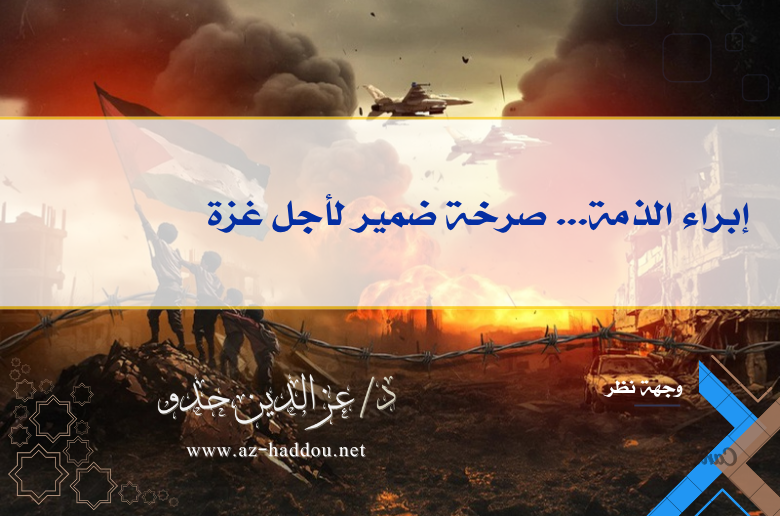إبراء الذمة… صرخة ضمير لأجل غزة
إبراء الذمة... صرخة ضمير لأجل غزة
لم تعد الكلمات تكفي. ولم يعد الصمت خيارا. في ظل المجازر المستمرة بحق أهلنا في غزة، ومع اتساع رقعة الألم والخذلان، تطرح الذات المؤمنة على نفسها سؤالا وجوديا لا يُمهل ولا يُرجأ: ما موقف إبراء الذمة؟
في العقيدة الإسلامية، ليس الحياد موقفا عندما تكون الجراح مفتوحة، والدماء تُسفك ظلما وعدوانا. فالمسلم، كما في الحديث الصحيح، “لا يُسلم أخاه ولا يخذله”، وفي موضع آخر “من لم يهتم بأمر المسلمين فليس منهم”. هذه النصوص، وغيرها كثير، تؤسس لمبدأ لا لبس فيه: أن الوقوف مع المظلوم ليس تفضُّلا، بل واجب ديني، وإنساني، وأخلاقي.
إن ما تتعرض له غزة اليوم، من قتل جماعي وتجويع وحصار وتشريد وتدمير للبيوت فوق رؤوس أهلها، يتجاوز حدود الخلافات السياسية، ويرتقي إلى فصول جديدة من التواطؤ الدولي، والعجز العربي، والصمت الإسلامي الشعبي والرسمي.
في ظل هذا السياق المظلم، ينبغي على كل صاحب ضمير حيّ أن يتخذ موقف إبراء الذمة، عبر أشكال متعددة، كلّ بحسب موقعه وقدرته:
-
بالكلمة الصادقة التي تعرّي المجرم، وتفضح الظلم، وتبقي على شعلة الوعي متقدة.
-
بالدعاء الصادق، سلاح الضعفاء الأقوياء.
-
بالدعم المادي والإغاثي، حيث يصل الخير إلى مستحقّيه رغم سدود الحصار.
-
بالتحرك في الهيئات والمؤسسات والمنتديات، دفاعا عن قضية الأمة الأولى، ومحاولة التأثير في صناعة الرأي العام، أو على الأقل كسر جدار التبلد والاعتياد.
-
بتربية الأجيال على أن فلسطين ليست قضية تطوى، ولا مأساة تنسى، بل عقيدة ووعي وانتماء.
نكتب هذا المقال لإبراء الذمة أولا، أمام الله والتاريخ والناس. ولعل الكلمة، إذا صدقت، تكون سهما في خاصرة الباطل، وتذكيرا مستمرا بأن هناك من لم ينسَ، ولم يبع، ولم يصمت.
غزة اليوم ليست اختبارا للشعوب وحدها، بل للأخلاق، وللإنسانية، وللإيمان.
وإبراء الذمة لا يكون بالخطابات الزائفة، ولا بالشعارات الجوفاء، بل بالفعل الصادق، والموقف الشجاع، ولو بأضعف الإيمان.
د. عزالدين حدّو
باحث مغربي
تاريخ النشر: [03/08/2025]
Discharging the Moral Duty:
A Stand Amid the Bloodshed in Gaza
Words are no longer enough. Silence is no longer an option. In the face of the ongoing massacres against our people in Gaza, as pain and betrayal spread like wildfire, the believing soul poses to itself an urgent and unavoidable question: What is my duty to discharge my moral and religious responsibility?
In Islamic belief, neutrality is not a legitimate stance when wounds are open and blood is unjustly and brutally shed. The Prophet Muhammad (peace be upon him) said, “A Muslim does not abandon or forsake his brother,” and in another narration, “Whoever is not concerned with the affairs of the Muslims is not one of them.” These and many other texts lay down an unambiguous principle: Standing with the oppressed is not a favor; it is a religious, humanitarian, and moral obligation.
What Gaza is experiencing today—from mass killings, starvation, siege, displacement, to the destruction of homes upon the heads of their inhabitants—goes far beyond political disagreements. It has entered new, horrifying chapters of international complicity, Arab helplessness, and both official and popular Islamic silence.
In the midst of this dark reality, every person with a living conscience must adopt a stance of moral exoneration (Ibrā’ al-Dhimmah)—in whatever form they are capable:
- Through honest words that expose the criminal, reveal the injustice, and keep the flame of awareness burning.
- Through sincere supplication—the weapon of the weak who are stronger in faith.
Through material and humanitarian support that reaches the deserving despite the barriers of blockade.
Through engagement in institutions, organizations, and forums in defense of the Ummah’s foremost cause, influencing public opinion, or at the very least breaking the wall of numbness and normalization.
Through raising generations to believe that Palestine is not a forgotten file nor a buried tragedy, but a matter of creed, consciousness, and belonging.
We write this article to discharge our duty first and foremost—before God, history, and humankind. And perhaps a sincere word can become an arrow in the side of falsehood, and a lasting reminder that some have not forgotten, not sold out, and not remained silent.
Gaza today is not merely a test for nations, but a test for morality, for humanity, and for faith itself.
Discharging one’s duty is not done through hollow speeches or empty slogans, but through truthful action and courageous stance—even if it be with the weakest level of faith.
Dr. Azeddin Haddou
Moroccan Researcher
Date of Publication: [03/08/2025]

